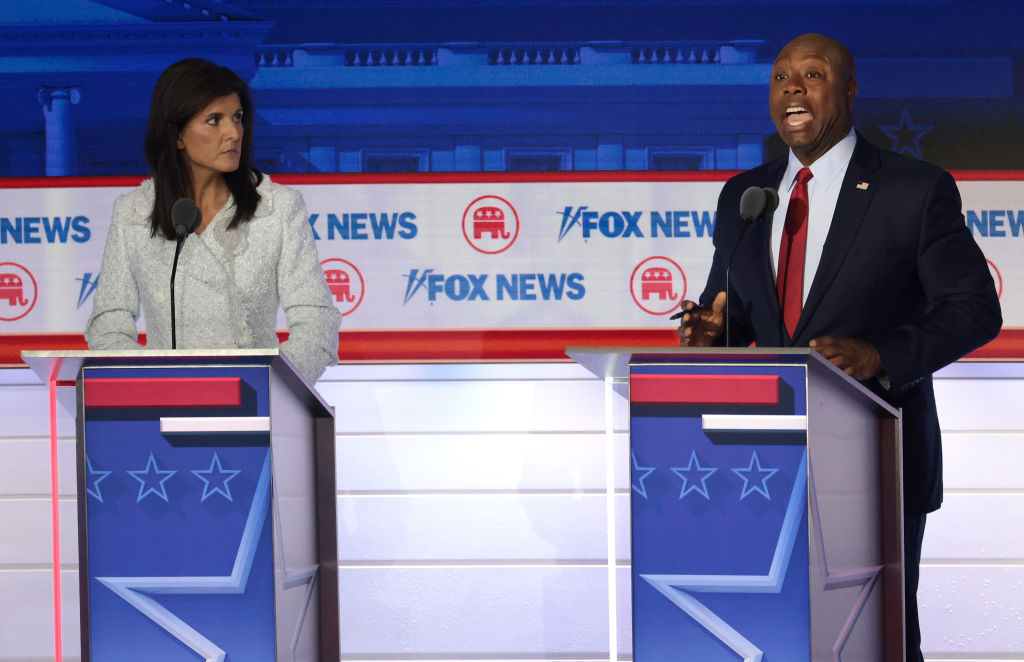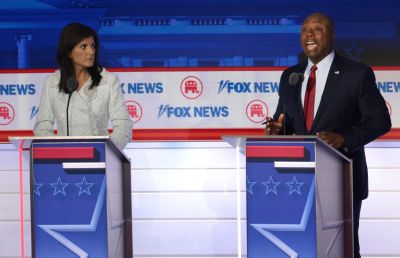Nikki Haley and Tim Scott are two South Carolinians headed in opposite directions—in Iowa.
Interest in Haley’s once stagnant presidential campaign is spiking in the Hawkeye State after the former South Carolina governor and former U.S. ambassador to the United Nations delivered a crisp performance in the first Republican debate on August 23 that was lauded by grassroots conservatives. Meanwhile, Scott faces fresh doubts about his viability after the previously ascendant South Carolina senator turned in an uneven showing on the big stage in Milwaukee.
“Tim Scott whiffed and Nikki looks like the real deal,” says a neutral Republican consultant in Iowa. Adds a second unaffiliated GOP operative based there: “People around here think Tim Scott really missed the moment at the debate. Nikki Haley, meanwhile, surged.” Both strategists requested anonymity to speak candidly.
That’s a change from what pre-debate polling indicated: Scott is running third in Iowa behind former President Donald Trump and Florida Gov. Ron DeSantis, both in the RealClearPolitics average and a mid-August poll conducted by expert Iowa pollster J. Ann Selzer for NBC News, the Des Moines Register, and Mediacom. In both data sets, the senator outpaces Haley. But no new Iowa surveys have been made public since the prime-time debate.
The Scott campaign and its surrogates insist his support hasn’t eroded relative to Haley’s since then.
“Over the past few days he’s crossed the state meeting with Iowans and I was able to hit a few of his town halls—and the venues were packed with standing room only,” David Young, the Republican former congressman and top Scott supporter in Iowa, told The Dispatch in a text message before Labor Day. “Tim’s momentum and support here in Iowa is real. More and more people are seeing the same thing I am, and they’re excited.”
The Scott campaign says that positive energy was evident on the trail over the Labor Day weekend. “Our steady, upward momentum is thanks to the fact that voters know he’s the candidate who can defeat [President] Joe Biden,” says spokesman Matt Gorman, who was traveling with the senator leading up to the holiday.
Though they concede they have not viewed fresh polling, neutral Republican operatives in Iowa say the increase in enthusiasm surrounding Haley is palpable. More GOP activists in Iowa are reaching out to Haley’s campaign offering to lend a hand. More importantly, more Republican voters likely to participate in the January 15 Iowa caucuses are attending Haley events and considering her for the 2024 nomination.
The evidence is a breakthrough in fundraising, the Haley campaign says.
In the 72 hours following the debate, the former ambassador raised $1 million, boosted by a 1,000 percent increase in contributions from grassroots Iowa donors compared to Iowa fundraising in the three days before the debate, according to her campaign. Additionally, prominent Iowa Republicans backing the former governor say their phones have been buzzing nonstop since before the Fox News telecast concluded.
“Ever since the debate last week—even during the debate—my phone has been going off with calls and text messages with people wanting to coordinate support for Ambassador Haley and people saying they’re ready to commit,” Austin Harris, a Republican member of the Iowa House of Representatives, said in a telephone interview a few days before Labor Day.
Haley’s Iowa supporters were hesitant to overtly criticize Scott. The 57-year-old senator, who is black, is well liked for his sunny civility and public embrace of his Christian faith. And Scott is admired for a rags-to-riches rise in politics that saw him jump from a humble socioeconomic upbringing to running his own small business, to the Charleston County Council, to the House of Representatives, to the Senate. (Scott was appointed to fill a vacant Senate seat in 2012 by then-Gov. Haley.)
But to the extent Haley, 51, is now the more popular South Carolinian in Iowa, Republicans backing her campaign say it is because Scott underperformed in the debate and left likely caucusgoers questioning his fortitude for the presidency.
“Senator Scott has been well received here in Iowa for his positive message and his impressive life story,” Haley supporter Chris Cournoyer, a Republican serving in the Iowa Senate, says in an email exchange. “But I’m hearing that the debate stage wasn’t the best venue for Senator Scott to communicate his message and he came off as untested for such a big platform.”
Meanwhile, Trump is dominating the primary in almost every way and continues to cast a pall over all of the candidates, including Haley and her post-debate bump in Iowa. He’s way ahead nationally, way ahead in the key early primary states, and is considered by GOP voters to be the most electable contender they could nominate to run against Biden. Additionally, the Republican candidate polling the best in Iowa after Trump is DeSantis.
Yet Iowa Republicans supporting Haley and Scott insist the appetite to move on from Trump is larger than polls suggest—at least in their state. The caucuses, they argue, are legitimately competitive. “It is absolutely a live race. Iowans are notorious for upsetting the apple cart,” Harris says.
Trump did not participate in the debate. Among the eight candidates who did, DeSantis, Haley and wealthy biotech entrepreneur Vivek Ramaswamy were widely considered the winners in post-debate national polls and focus groups. Scott made no gaffes or major mistakes and at times offered a glimpse into why some Republican voters find him so appealing. But the general consensus was that he did not exude the personal strength and combativeness Republicans are looking for in a leader.
The Scott campaign rejects that characterization.
The senator’s supporters say he prefers to criticize Biden and avoid intramural food fights that make for viral debate moments and appeal to a large segment of the Republican base. But they acknowledge this strategy created challenges for Scott on the Milwaukee debate stage and suggested he could approach the second debate differently to compensate. The Republican White House hopefuls next face each other on stage in late September at the Ronald Reagan Presidential Library and Museum in Southern California.
“There will be future debates and I’m certain that coming out of this, you always adapt to, and make changes, sort of, in your game plan, based on the past performances,” Senate Minority Whip John Thune, a prominent Scott supporter, told reporters in the spin room immediately after the debate.
“But I felt like he was the most presidential candidate on the stage,” the South Dakota Republican quickly added. “He was confident, he was calm. I think he asserted leadership and didn’t get into some of the back and forth and the bickering that went on, on the stage, which I think probably is the surest way to reelect Joe Biden.”






Please note that we at The Dispatch hold ourselves, our work, and our commenters to a higher standard than other places on the internet. We welcome comments that foster genuine debate or discussion—including comments critical of us or our work—but responses that include ad hominem attacks on fellow Dispatch members or are intended to stoke fear and anger may be moderated.
With your membership, you only have the ability to comment on The Morning Dispatch articles. Consider upgrading to join the conversation everywhere.